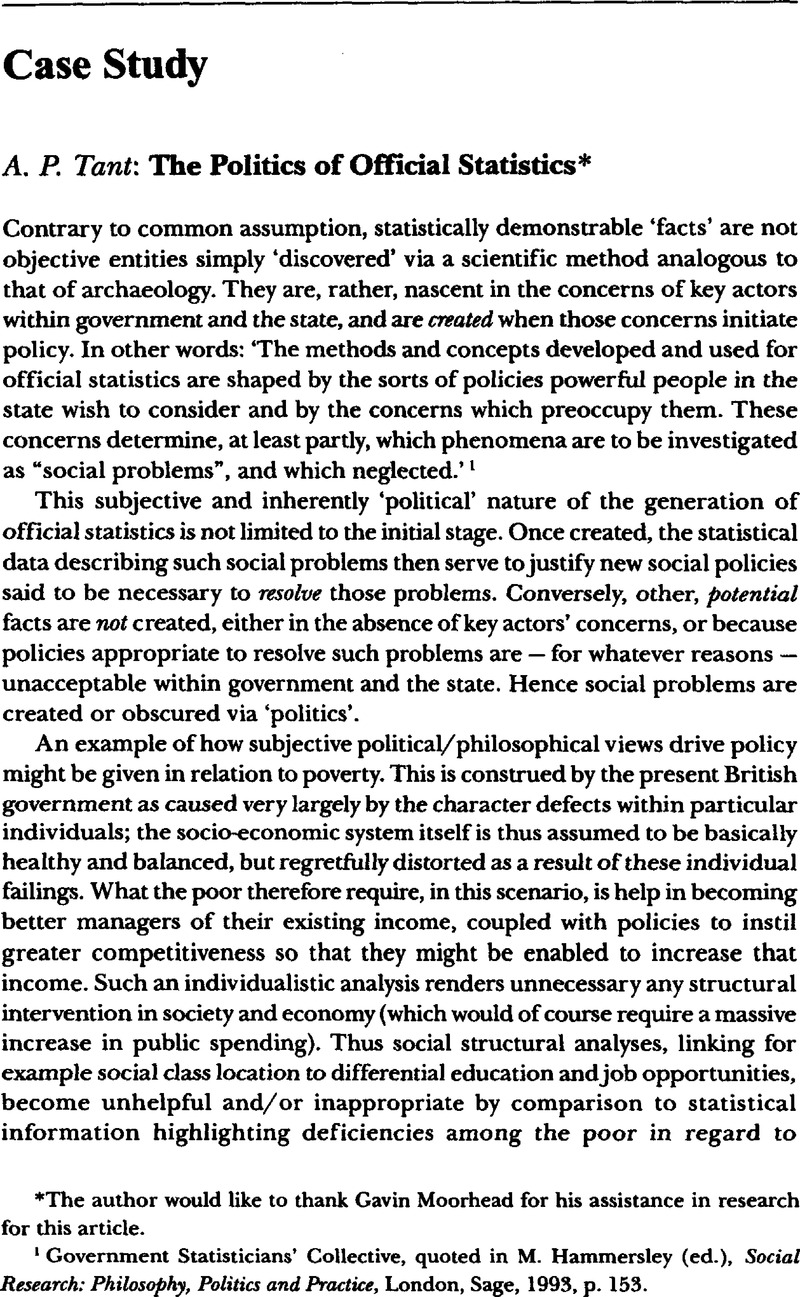Published online by Cambridge University Press: 28 March 2014

1 Government Statisticians’ Collective, quoted in Hammersley, M. (ed.), Social Research: Philosophy, Politics and Practice, London, Sage, 1993, p. 153 Google Scholar.
2 Delamothe, T., ‘Statistics Today: Urgent Need to Depoliticise Official Figures’, The British Medical Journal, 23–30 12, 1989, p. 1543 Google Scholar.
3 Possibly the most influential document in this regard is, paradoxically, unpublished. It is a report by Professor B. Benjamin: Accessibility and Other Problems Relating To Statistics Used By Social Scientists.
4 Delamothe, op. cit.
5 ibid.
6 ibid.
7 Fanu, Dr J. Le, Daily Telegraph, 10 05 1994, p. 18 Google Scholar.
8 See the British Medical Journal, No. 6937, Vol. 308, 30 April 1994, pp. 1125–28.
9 Jury, L., ‘Study Shows Poor are Dying Younger’, The Guardian, 29 04 1994, p. 4 Google Scholar.
10 ibid.
11 Delamothe, op. cit.
12 ibid.
13 The numbers registered as unemployed in fact reflect the numbers receiving unemployment benefit rather than those seeking work (but ineligible for that particular benefit, if possibly claiming one of a number of others, or undertaking training schemes etc.).
14 Government Statisticians’ Collective, in M. Hammersley (ed.), op. cit., p. 154.
15 ibid., p. 155.
16 The Economist, 28 July 1990, p. 15.
17 ibid., p. 22.
18 In the following section I draw heavily upon the comprehensive analysis of Coutts, K. and Godley, W. in ‘The British Economy Under Mrs Thatcher’, The Political Quarterly, Vol. 60, No. 2, 1989 Google Scholar.
19 ibid., see chart 5, p. 139.
20 ibid., see chart 14, p. 144.
21 ibid., see chart 5, p. 139.
22 ibid., see chart 1, p. 138.
23 ibid., see chart 2, p. 138.
24 ibid., see chart 3, p. 138.
25 ibid., see chart 4, p. 139.
26 See e.g. The Economist, 28 July 1990, p. 22.
27 Households Below Average Income, HMSO, 14 July, 1994.
28 See News Release, issued by the (Labour Party) Campaigns and Communications Directorate, Walworth Road, London, 2 Feb. 1994.
29 ibid., p. 2.
30 See e.g. The Economist, 26 May 1990, p. 32.
31 Delamothe, op. cit.
32 Royal Statistical Society Working Party Report, Official Statistics: Counting With Confidence, 1990, p. 3.
33 ibid., p. 5.
34 CSO Press Office release, 19 Feb. 1993.
35 ibid.
36 Leaving aside the centrality of the formal constitutional position of the monarch and the survival of an unelected second chamber, where the norm is popular sovereignty with a written constitution and a bill of rights, Britain has parliamentary sovereignty, an uncodif ied constitution and ‘traditonal freedoms’; in place of fixed terms of office, Britain has a maximum term at governmental discretion; rather than by proportional representation, British elections are held under the ‘first-past-the-post’ system; rather than the major cleavage being between executive and legislature, Britain has an executive-dominated system conditioned throughout by the Government v. Opposition divide; and where a Freedom of Information Act is more common, Britain has instead the tightest official secrecy provisions seen anywhere in the democratic world. But if Britain generally has centralization against more decentralized norms, in relation to the statistical service the position is reversed: Britain’s somewhat decentralized system is at odds with the norm of a centralized but independent system elsewhere.
37 Some argue e.g. that ‘the government is using statistics like a drunk uses a lamp post — for support rather than illumination’, The Economist, 28 July 1990, p. 16.
38 Official Statistics: Counting with Confidence, RSS, 1990, p. 6.
39 ibid., p. 4.
40 ibid., p. 7.